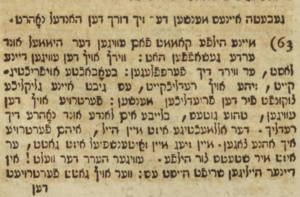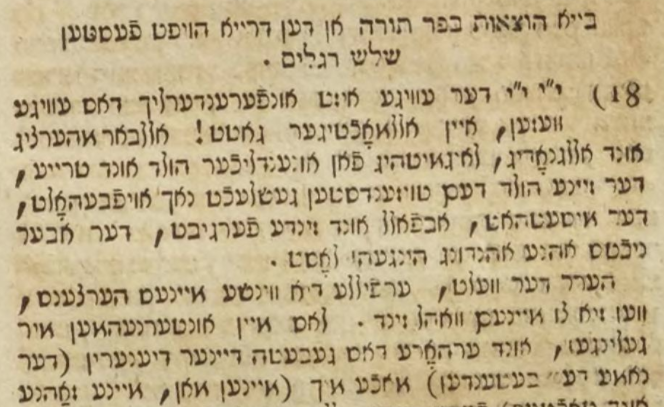| Source (German) | Translation (English) |
|---|---|
Gebet eines Menschen der sich durch den Handel nährt. |
Prayer of a person who feeds themself through trade. |
Meine Hilfe kommt vom Ewigen, der Himmel und Erde geschaffen hat. |
My help comes from the Eternal, who created heaven and earth. (Psalms 121:2) |
Wirf auf den Ewigen deine Last, er wird dich verpflegen. Beobachte Aufrichtigkeit, siehe auf Redlichkeit, es giebt eine glückliche Zukunft für den friedlichen Menschen. Vertraue auf den Ewigen, thue Gutes, bleibe im Lande und nähre dich redlich. |
Throw your burden on the Eternal, he will feed you. Observe sincerity, recognize integrity; there is a happy future for the peaceful person. Trust in the Eternal, do good, stay on the land and feed yourself honestly. |
Der Allmächtige ist mein Heil, ihm vertraue ich ohne Zagen. Mein Sieg, mein Saitenspiel ist Gott, er ist mir stets zur Hilfe. |
The Almighty is my salvation, I trust in him without hesitation. God is my victory, my playing of strings, he is always my help. |
Ewiger Herr der Welt! In deiner heiligen Schrift heißt es: du ernährst alle Wesen. Ewiger, Gott der Wahrheit, gieb Segen und Glück in mein Händewerk und in meine Geschäfte, damit ich mich und mein Haus kummerlos ernähre, auf erlaubter Weise, ohne Uebertretung eines Gesetzes, zum Leben und zur Glückseligkeit. |
Eternal Lord of the world! In your holy scripture it is said: you nourish all beings.[1] Cf. Psalms 145:16. Eternal God of truth, grant blessing and happiness to my handiwork and to my business, so that I may feed myself and my house without sorrow, in a lawful way, without transgression of any law, for life and happiness. |
O Allmächtiger, der du jedem Geschöpfe Nahrung bereitest, jedes Wesen nach seiner Art bekleidest und erhälst! Erhalte und ernähre mich und mein Haus und ganz Israel ohne Schmerz, ohne Uebertretung eines Gesetzes, ohne Schande, ohne Beschämung. Gieb uns unsere Nahrung aus deiner heiligen, stets gefüllten Hand, und nicht durch die Hand der Menschen. Möge unsere Nahrung stets bereit sein, ehe dringende Noth eintritt, auf daß wir uns freudig mit deinem Gesetze beschäftigen, und alle deine Gebote ohne Hinderniß beobachten können! Möge unser Auge nie nach dem Tische fremder Menschen schmachten, und mögen wir, um der Nahrung willen, Niemanden als dir unterthänig sein. Mögen wir stets im Stande sein, uns anständig zu kleiden, damit wir nie zu Demüthigung, Erniedrigung und Herabsetzung kommen. Beglücke uns vielmehr, daß wir im Stande sein mögen, Gastfreiheit zu üben, Almosen zu geben, und gefällig zu sein gegen jeden Menschen, und schicke uns immer würdige Gegenstände der Wohlthätigkeit zu. Amen. |
O Almighty, you who prepare food for every creature, clothe and sustain every being according to its kind! Sustain and nourish me and my house and all Israel without pain, without transgression of a law, without shame, without embarrassment. Give us our food from your holy, ever-filled hand, and not by the hand of man. May our food always be ready before urgent need arises, so that we may joyfully occupy ourselves with your law, and observe all your commandments without hindrance! May our eyes never pine for the table of strangers, and may we, for the sake of nourishment, be subservient to none but you. May we always be able to dress decently, so that we never come to humiliation, degradation and degradation. Rather, make us happy so that we may be able to practice hospitality, give alms, and be pleasing to every person, and always send us worthy objects of charity. Amen. |
“Gebet eines Menschen der sich durch den Handel nährt” was translated/adapted by Yehoshua Heshil Miro and published in his anthology of teḥinot, בית יעקב (Beit Yaaqov) Allgemeines Gebetbuch für gebildete Frauen mosaischer Religion. It first appears in the 1829 edition, תחנות Teḥinot ein Gebetbuch für gebildete Frauenzimmer mosaischer Religion as teḥinah №63 on pp. 90-91. In the 1835 edition, it appears as teḥinah №65 on pp. 113-114. In the 1842 edition, it appears as teḥinah №68 on pp. 118-119. The prayer is thematically closely related to the Birkat haMazon.
We welcome corrections and improvements. The transcription of the German from Latin script in Fraktur type provided machine-readable text for a machine translation by DeepL, which we then edited for accuracy and clarity. –Aharon Varady
Source(s)


Notes
| 1 | Cf. Psalms 145:16. |
|---|

“Gebet eines Menschen der sich durch den Handel nährt | Prayer of a person who feeds themself through trade, a teḥinah by Yehoshua Heshil Miro (1829)” is shared through the Open Siddur Project with a Creative Commons Attribution-ShareAlike 4.0 International copyleft license.










Leave a Reply